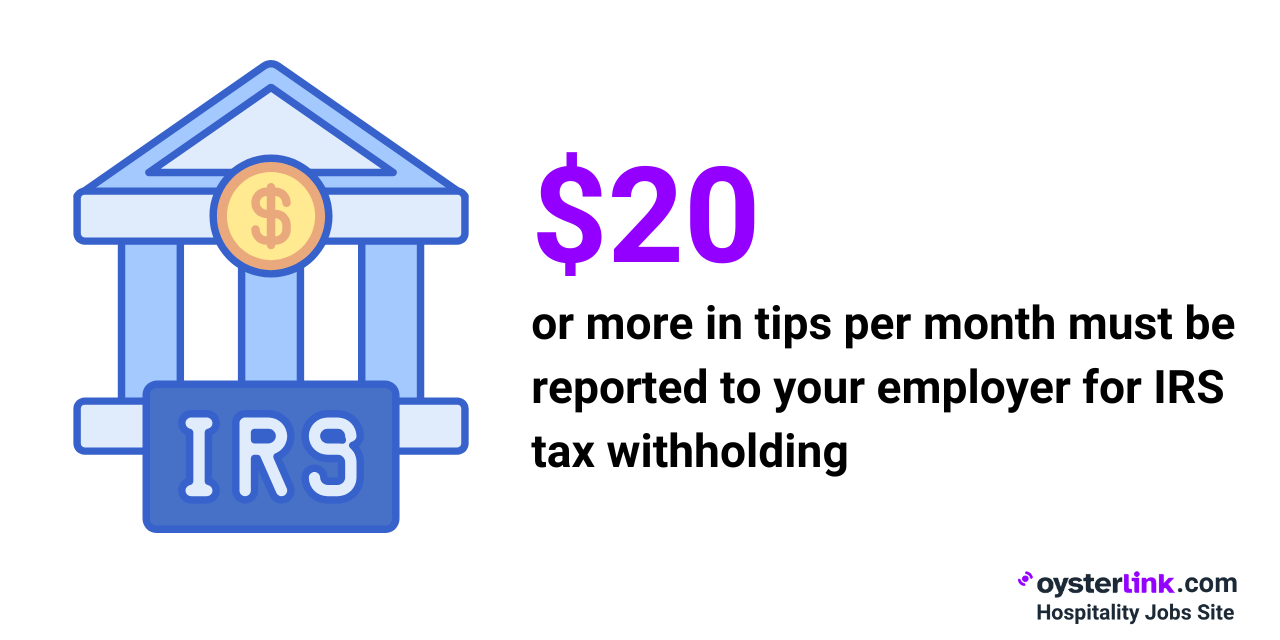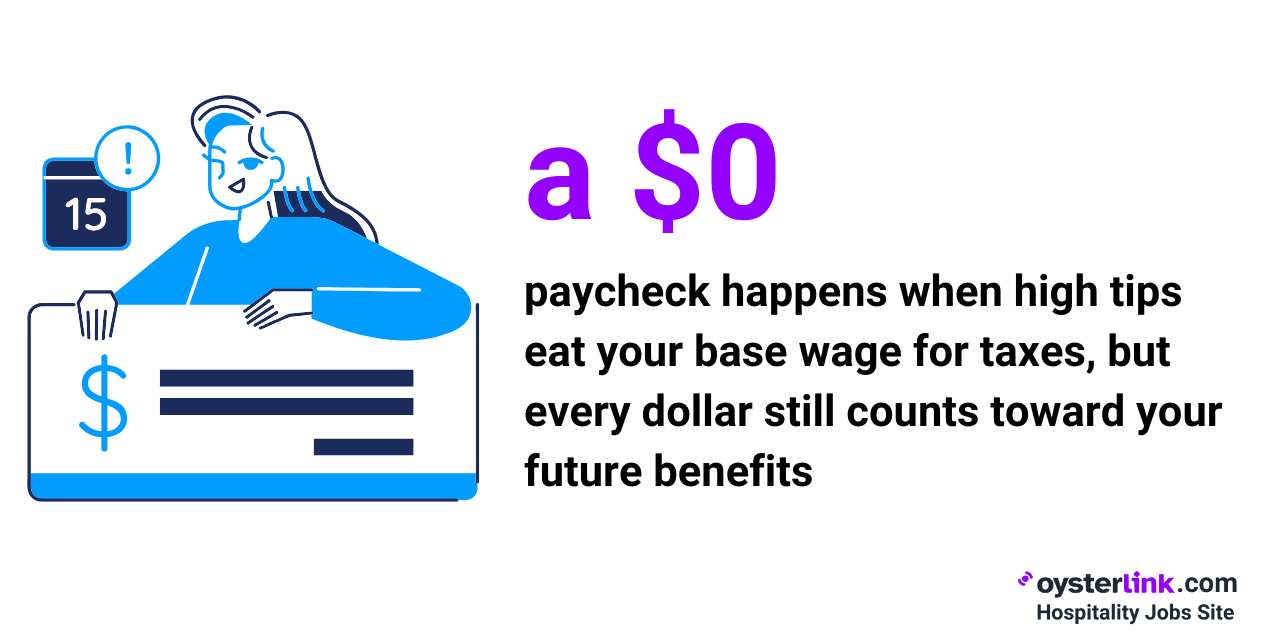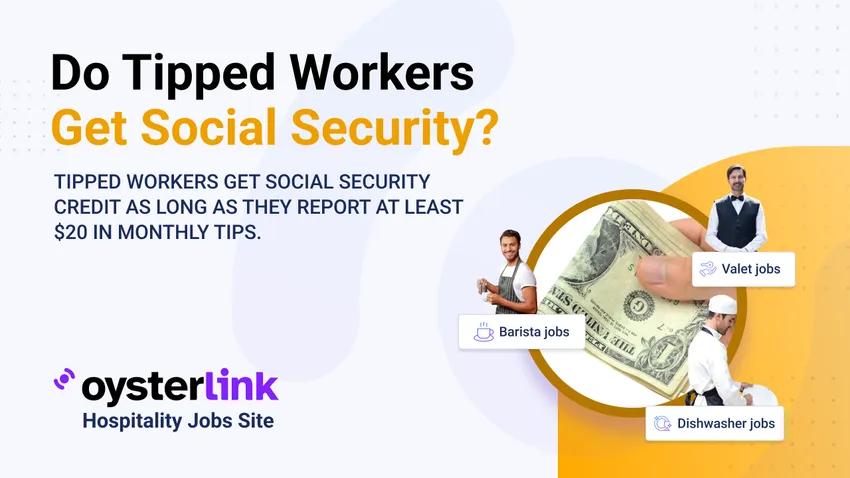Do tipped workers get Social Security? Yes—and the answer matters more than most Servers, Bartenders, and hospitality workers realize.
In this guide, we’ll break down exactly how tips count, what you and your employer must do, and the long-term impact on your benefits.
Do Tips Count Toward Social Security?
Yes. Reported tips count as wages for Social Security.
The IRS and SSA treat tips over $20 per month as taxable income, subject to Social Security and Medicare (FICA) taxes.

Why Reporting Tips Matters for Social Security Benefits and Retirement
Skipping tip reporting might feel harmless, but it shrinks your Social Security benefits. The SSA calculates retirement, disability, and survivor benefits from your reported earnings.
If you only report your $2.13 wage and not your $150 in tips, your record makes it look like you earned far less—slashing your future checks.
Source: Tax Project
How Tipped Workers Report Tips for Social Security and Taxes
The IRS makes it pretty simple. As a tipped employee, you’re expected to do two things:
- Track what you earn each shift (Form 4070A is optional—a notebook or notes app works too).
- If you earn $20+ in tips during a month, tell your employer by the 10th of the next month.
Doing so keeps your earnings accurate with the SSA, protects your benefits, and keeps you compliant with the law.
Employer Responsibilities for Reporting Employee Tips to Social Security
When you report tips, your employer is legally required to process them so your earnings count toward Social Security.
1. Withholding taxes on your reported tips
When you report your tips, your employer must treat them like wages. That means withholding:
- Social Security tax (6.2%)
- Medicare tax (1.45%)
- Federal and state income taxes (based on your W-4)
Your employer also has to pay their matching share of Social Security and Medicare on your tips. It’s not optional—once you report them, tips are wages in the eyes of the law.
2. Paying their share
If you’ve ever had a $0 paycheck, here’s why: sometimes your reported tips are so high compared to your base wage that your entire paycheck goes to covering taxes.
That doesn’t mean you worked for free, it means your tip income is being taxed and credited toward Social Security.

If your paycheck isn’t enough to cover all the taxes owed, your employer withholds as much as possible and notes the unpaid amount on your W-2.
You’ll settle the rest at tax time (or you can hand over some cash tips during the year to cover the gap). Either way, your tips still count toward your benefits.
3. Reporting to the government (W-2 forms and more)
Your employer is responsible for officially reporting your wages and tips:
- Form W-2: Shows total wages (Box 1), Social Security tips (Box 7), and Medicare wages/tips (Box 5).
- SSA/IRS Reporting: This ensures your tips are credited to your Social Security record.
4. Keeping records
In tip pools or tip-outs, 'Allocated Tips' on your W-2 (Box 8) signals the IRS thinks you under-reported - so either prove your records or add the income on Form 4137 so it’s taxed and counted for Social Security.
What Happens If You Don’t Report Cash Tips to Social Security and IRS
Some coworkers may say, “Just don’t report your cash tips, you’ll keep more money.” But skipping out now can cost you big later.
Here’s why:
- Your Social Security is based on your top 35 earning years
- Not reporting income is illegal. If caught, you could face steep penalties
- Low reported income weaker loan or rental applications.
Common Myths and Misconceptions About Tips and Social Security Benefits
“I only make $2.13 an hour, so that’s all Social Security cares about.”
Wrong. Social Security counts all your taxable earnings, including tips. If you earn $100 in tips on a shift, your real income is $102.13.
“My cash tips are off the books—no one will know.”
Maybe not today, but the IRS can spot mismatches, especially against credit card tips. More importantly, you’ll know later when your Social Security record is too low to support you.
“Social Security won’t be around when I retire, so why bother?”
Social Security has been paying since 1935 and isn’t going away entirely. Even if rules change, what you earn today counts.
“It’s too much hassle to track every little tip.”
Tracking tips can be as simple as jotting notes in your phone or notebook after each shift. A minute a day avoids headaches and keeps you protected.
“My employer will get mad if I report too much in tips.”
By law, your employer must withhold and match FICA on reported tips and they even get a tax credit to ease the cost.
If management pressures you not to report, they’re breaking the law and undermining your future. Don’t play along.
Steps to Report All Tips Correctly So They Count Toward Social Security
- Record tips every shift: cash, credit, and tip-outs.
- Report monthly. If not, submit a written total or email and keep a copy.
- Make sure tips show up as earnings and taxes are withheld.
- Include all tips on your 1040. If you missed some during the year or see Box 8 (Allocated Tips) on your W-2, use Form 4137.
- Set up a free my Social Security account at SSA.gov. Check yearly that your reported income matches your records.
Bottom Line: How Tips Count Toward Social Security Retirement Benefits
Tipped workers get Social Security as long as tips are reported.
Treat tips like wages - report them, pay tax, and protect your future. Every dollar you count now boosts the benefits you’ll rely on later."








Loading comments...